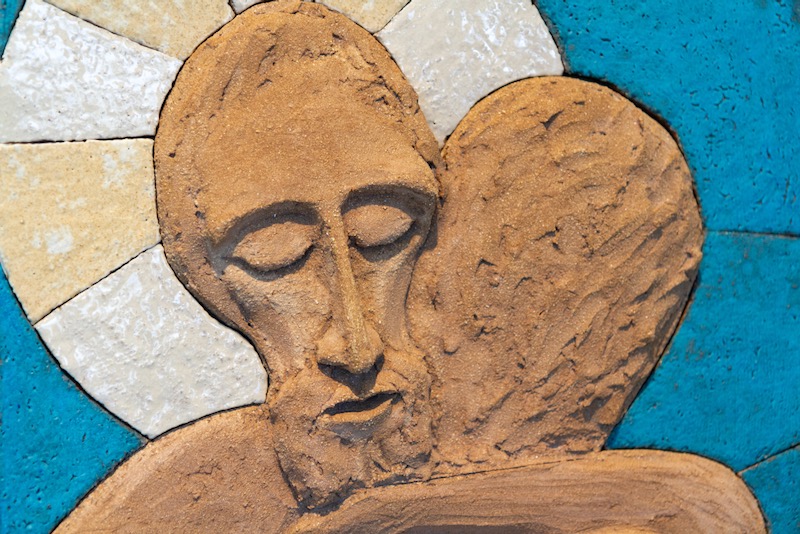I have always been fascinated by the answer to Peter’s question to Jesus about forgiveness. “Lord, how often must I forgive my brother[…]? Seven times?” Jesus answers, “Not seven, but seventy-seven times” (Mtt 18:21). As a person with several brothers and sisters, this question-and-answer was important to me, from when I was little; it felt immediately relevant. But I discovered there were different versions of it. This first version quoted is the one which came up in the Mass readings relatively recently, in the middle of September. But that’s not the version I grew up with. The version we studied at school was the RSV, where it says “seventy times seven”, and a footnote blithely offers “Or seventy-seven times”.
Seventy times seven is four hundred and ninety, quite a lot more than seventy-seven. That sort of mistake in arithmetic would be serious in a different context. Why were the totals regarded as interchangeable?
Of course the answer is that it’s not a literal number, it’s a magic number. Magic numbers in modern English culture tend to be huge and vague (billions, trillions, gazillions) rather than linked to something countable. Hundreds or thousands are usually enough for anything we might need to discuss, with the -illions reserved to coverage of the Budget or the National Debt. I find it easier personally to deal in smaller numbers, say up to a dozen, and I suspect many other people do too.
But human beings like numbers and counting; it’s one way to impose order on whatever is happening around you, especially if you are not in charge of any of it. I think this might be one reason why small children sometimes count their steps out loud when they are walking; after all, these are things they couldn’t do (either the steps or the counting) a little while back. (And it’s particularly fetching if the counting can’t get past five without coming off the rails.) If you are trying to keep track of something, you count it (sheep, coins, cowrie shells), even if other people can’t understand your counting (old numerical nursery rhymes, for example, the whole group of numerals around yan tan tethera, with complicated origins, a lot of crossover, but no one source). The yan tan tethera set of numbers reaches twenty, and then starts again. That’s more than twelve, but still something easy to deal with on a human scale, fingers and toes. Shepherds would use a pebble for each group of twenty, and keep their tally (or “score”) that way.
Numbers help with mnemonics. If you know there’s a definite group of ideas to remember, having a number means you won’t leave any out, but also seems unfortunately to guarantee that you’ll have trouble remembering the last one or two (twelve apostles, ten plagues of Egypt, ten commandments, seven sacraments, and so on). Smaller numbers are much easier, like the four last things and the evangelists; and two seems to be a number there to emphasise just how few it is: thus we have five loaves but (only) two fish, and the widow’s mite, “(only) two copper coins”.
The Book of Numbers in the Bible starts with God calling a long and complicated census, and continues with various other lists of numbers (of fighting men, mostly), and a further census later, after the plague. It contributes to our Sunday readings only three times: once for the beautiful formula of blessing which God gives to Aaron (Num. 6:22ff), once when Eldad and Medad are prophesying in the camp (Num. 11:25ff) and once when the bronze serpent is raised on a pole for those bitten by a snake to look at and be healed (Num. 21:4ff). This fourth book of the Pentateuch is not actually called “Numbers” in the original Hebrew; it’s called ‘in the desert’ because it tells the story of the Israelites wandering around for forty years before coming in sight of the Promised Land. The focus is not on the counting; but the numbers mentioned in the Bible are often given more meaning than their simple numerical value.
Numerological tradition did not start with the Jews, although we use their name for it (“gematria”). Versions of it can be found in ancient Babylonian texts, and then later Greek and on to the Romans and beyond. Early Christians developed their own versions and it was very popular in the Middle Ages. Playing with numbers is always fun (hence the success of sudoku), and the fascination of codes and code-breaking keeps some people happily occupied for years and years. Gematria is a system for turning letters into numbers and assigning significance to the numbers.
It also proves that it was perfectly possible to get lost down a wormhole long before the internet, but luckily it’s tangential in the Bible, so I don’t have to spend too much time on its wilder fringes. It’s all a bit Dan Brown, but it can explain why some people regard certain biblical details as crucially important, when to modern ears they seem random or baffling. Thus the dimensions of Noah’s ark (in Genesis 6), or the Heavenly City (in Revelation 21) are lengthily spelt out, but their significance is mystical rather than a blueprint. It’s the same with the various enormous ages of the patriarchs. We are in an area where seventy-seven might well be equivalent to four hundred and ninety; and the Heavenly City is a perfect cube.
Significant numbers vary from culture to culture, but since our culture is rooted in the same texts, it’s not surprising that we accept the same numbers as significant. So one is crucial as a marker for God, as in the Shema (“Hear, O Israel, the Lord our God, the Lord is one”, Deuteronomy 6:4), amid cultures which had multiple deities (almost every other religion at the time). Other significant numbers are three (good for balance and rhythm, not just in words; it’s easier to make a three-legged stool that doesn’t rock than a four-legged one), and seven, which is hugely significant in Jewish culture and many others. Ten has legal weight, because of the Commandments.
Twelve is a number which means completeness, perfection (this is why there are twelve stars on the EU flag, it’s nothing to do with the number of countries included), and twelve times twelve means perfection times perfection, i.e. as perfect a number as you can ever get. It does not mean a literal one hundred and forty-four. Even if they are thousands. You can see this in Revelation (a happy hunting ground for anyone interested in magic and magical numbers), where the saved are described once as “myriads of myriads and thousands of thousands” (5:11) and elsewhere as twelve thousand out of each of the tribes of Israel, adding up (of course) to twelve times twelve thousand, followed by “a great multitude which no man can number” (7:9). Henry Alford’s second most famous hymn goes for a different magic number, “Ten thousand times ten thousand”, but of course it does not mean any fewer. (He also wrote “Come, ye thankful people, come”.)
Like the book of Numbers, we don’t encounter much of the book of Revelation, or Apocalypse, in our usual readings at church, except in the Sundays after Easter in Year C. Seven is the magic number which comes back again and again in Revelation: seven churches, seven archangels, seven seals, seven stars, seven torches, seven bowls of the wrath of God. Seven is in the root of the Jewish word for covenant and oath (it’s also related to “Sabbath”, for obvious reasons). Like a high five today, it means more than just numerical value. The Lamb has seven horns and seven eyes; this is complete power and knowledge, and importantly, they match. One of the joys of Revelation is how the monsters have not-matching numbers of attributes. So you can have seven heads, ten horns and seven diadems (12:3,), or ten horns, seven heads and ten diadems (13:1) and you have to work out for yourself how you would divide them up. Another beast has “two horns like a lamb and it spoke like a dragon” (13:11). It’s much more like Hieronymus Bosch than Breugel. Not-matching numbers occur in the feeding of the five thousand: the five loaves and two fish clearly don’t balance or correspond (of course we don’t know the scale, the loaves might be large or small). Jesus uses this imperfection to feed everyone plenty, and then there are – perfectly -- a magic twelve baskets of leftovers.
Number patterns run through all sets of mythology and traditional tales. To move away from the Bible, the seventh son of a seventh son is supposed to have magical powers or the second sight (depends on the story). Princesses and sons always come in threes (indeed they do, I have a set of each). My youngest son and my youngest daughter are keen also to point out that it’s always the youngest who finally gets things right or solves the puzzle. I am not an oldest (effortless superiority, like my husband) nor a youngest (see above), so I simply pass this on. These numbers have significance, beyond their numerical value. But we don’t rank our children by their age or birthdate, that’s just how we stack them.
Numbers are fun, but they are not the point here. To go back to Peter’s original question, Jesus isn’t saying either four hundred and ninety, or seventy-seven; he’s just saying, you have to forgive him every time; give up on the counting.
Kate Keefe composes musical settings for the Mass and writes about the psalms. You can follow her on Facebook, Twitter and LinkedIn.



 Loading ...
Loading ...
What do you think?
You can post as a subscriber user ...
User comments (0)